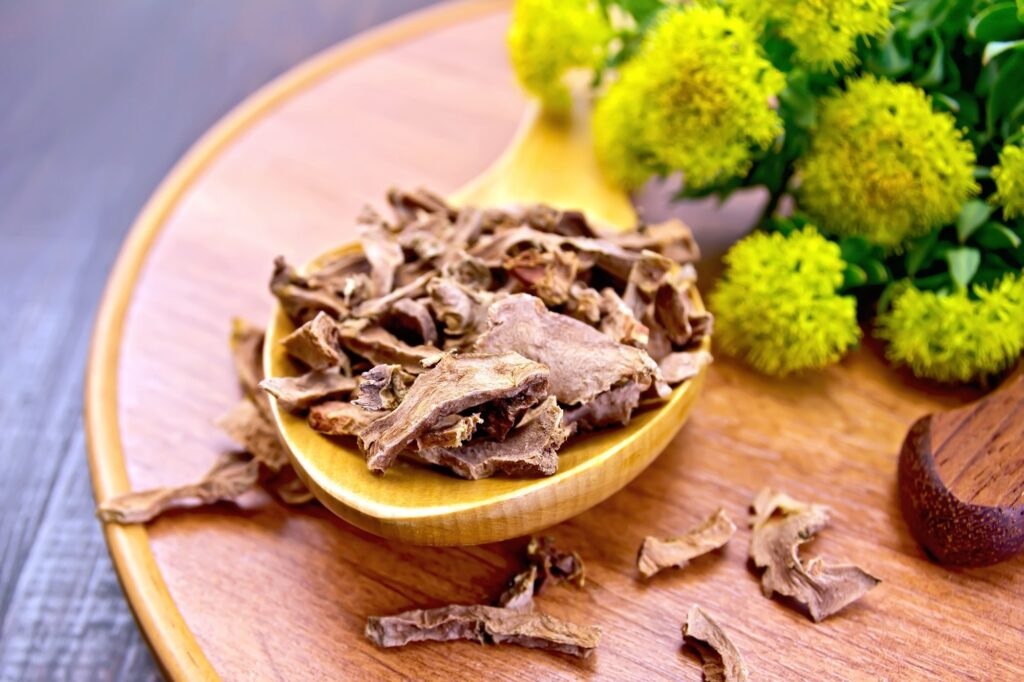
Rhodiola rosea, an adaptogenic herb with a rich history of medicinal use, is gaining attention for its potential in reducing stress and fatigue while enhancing cognitive and physical performance. Known as ‘golden root’ or ‘Arctic root,’ Rhodiola has been a staple in traditional medicine across Europe and Asia for centuries. However, its clinical utility today is challenged by inconsistent product quality and a lack of extensive long-term studies.
Botanical Background and Traditional Uses
Rhodiola rosea thrives in cold, mountainous regions such as Siberia, the Himalayas, and northern Europe. Historically, it has been used in Russian, Scandinavian, and Traditional Chinese Medicine to treat fatigue, anxiety, and altitude sickness. The primary compounds responsible for its adaptogenic effects are rosavins and salidroside, which are believed to normalize stress responses and provide antioxidant and neuroprotective benefits. Most standardized extracts ensure consistency by containing at least 3% rosavins and 1% salidroside.
Mechanisms of Action
Rhodiola’s effects are largely attributed to its influence on the hypothalamic-pituitary-adrenal (HPA) axis, which helps regulate stress hormones like cortisol. By modulating this axis, Rhodiola can reduce elevated cortisol levels, promoting a balanced stress response and aiding the body’s return to homeostasis. Additionally, it enhances neurotransmitter activity, including serotonin, dopamine, and norepinephrine, which may contribute to improved mood, focus, and energy. Rhodiola also possesses antioxidant and anti-inflammatory properties, reducing cellular damage from oxidative stress.
Scientific Evidence of Health Benefits
Stress and Fatigue Reduction
In a randomized controlled trial involving 60 patients with stress-related fatigue, those taking 576 mg/day of Rhodiola extract reported a 30% reduction in fatigue symptoms after four weeks compared to a placebo group. Similar benefits were observed in a cohort of 100 nursing students during exams, where Rhodiola improved alertness and reduced mental fatigue.
In a larger observational study with over 1,100 participants, Rhodiola significantly reduced stress-associated symptoms like irritability and exhaustion within three days of use, suggesting rapid action compared to conventional treatments.
Cognitive Function
Rhodiola’s impact on cognitive performance has been demonstrated in various studies. Military cadets under sleep deprivation reported improved reaction time and memory recall after Rhodiola supplementation. Night-shift physicians also noted enhancements in associative thinking and calculation speed.
Mood and Anxiety
Limited studies on Rhodiola’s effects on mood and anxiety show promising results, particularly in improving symptoms of anxiety and depression. A six-week study of individuals with mild-to-moderate depression found that Rhodiola extract improved mood and emotional stability with fewer side effects than sertraline, a common antidepressant.
Physical Performance and Endurance
Traditionally used by Siberian hunters and athletes, Rhodiola has been confirmed to enhance physical stamina. A double-blind crossover trial revealed that a single dose improved endurance exercise performance and reduced perceived exertion. Elite rowers taking Rhodiola supplements experienced lower lactate levels post-exercise, indicating better recovery and reduced fatigue.
Safety, Dosage, and Side Effects
Rhodiola is generally safe for short-term use, with effective doses ranging from 200 to 600 mg/day of standardized extract. Side effects are rare and mild, including dry mouth and dizziness. However, it is not recommended for pregnant or breastfeeding individuals due to limited safety data. Caution is advised when combining Rhodiola with antidepressants or medications affecting neurotransmitters.
Rhodiola is not regulated by most health agencies, so consumers should ensure they purchase high-quality supplements from trusted brands. Consulting with healthcare providers is recommended for those considering Rhodiola use.
Limitations and Areas for Further Research
Despite promising research, Rhodiola’s widespread adoption is limited by small sample sizes, short study durations, and methodological weaknesses in existing studies. Outcomes can vary based on extract type and dosage. Larger-scale trials are needed to explore Rhodiola’s long-term effects and its potential in treating chronic fatigue and anxiety disorders.
Conclusions
Rhodiola rosea is a well-studied adaptogen that supports stress resilience and reduces fatigue by modulating the HPA axis and enhancing neurotransmitter activity. Evidence supports its role in boosting cognitive performance, mood, and physical endurance, particularly in high-stress environments.
While Rhodiola offers a relatively safe and fast-acting option in modern wellness, caution is advised due to product variability and limited long-term data. As interest in herbal adaptogens grows, standardized, evidence-based approaches will be crucial. Prospective users should consult healthcare professionals and select high-quality formulations.





